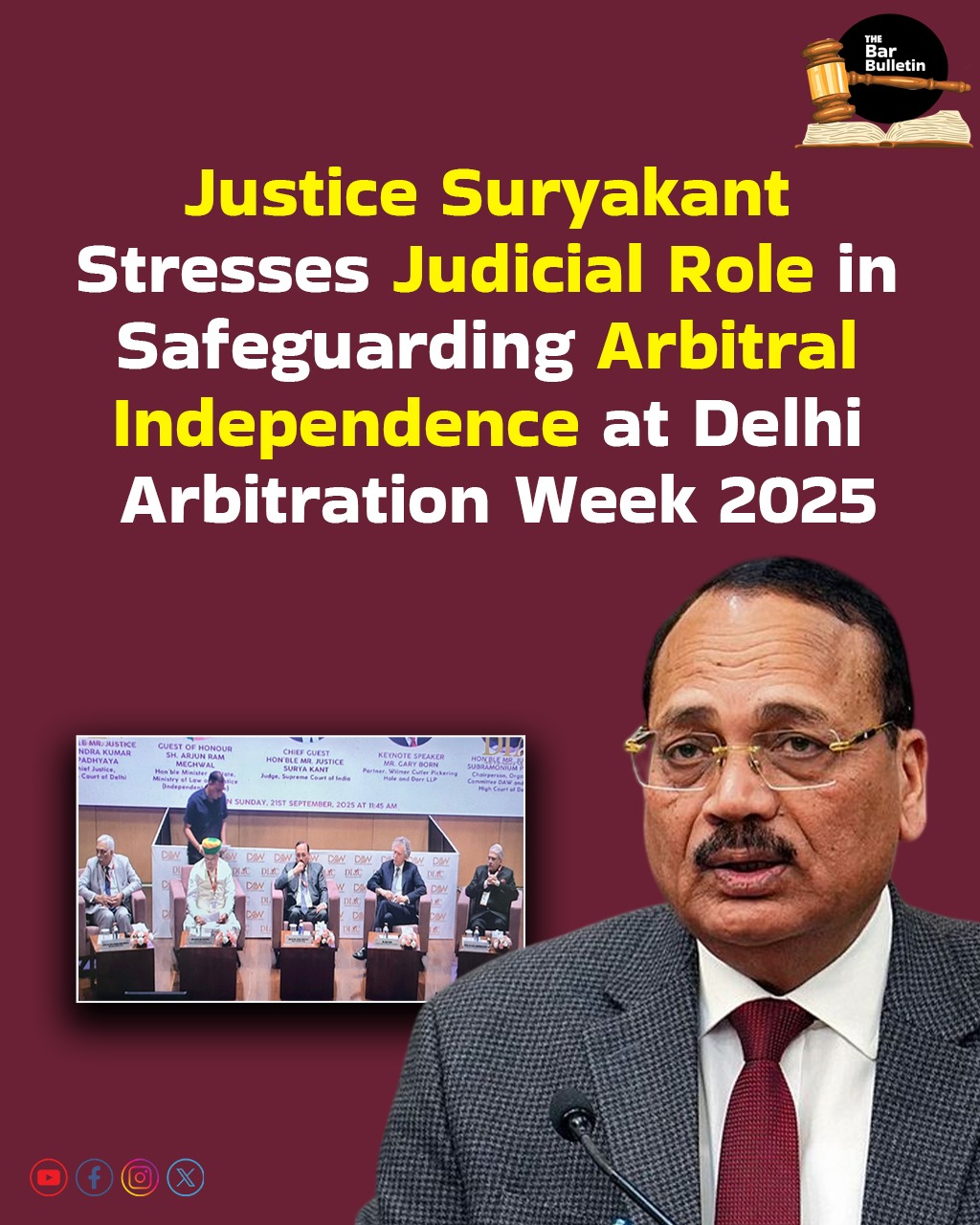The Closing Session of the Delhi Arbitration Weekend (DAW) 2025 held on 21 September 2025 at the Delhi High Court, jointly hosted by the Supreme Court of India, the Delhi High Court, and the Delhi International Arbitration Centre (DIAC). The event drew an illustrious audience of jurists, senior advocates, international delegates, and policymakers.
The session was graced by the Shri Arjun Ram Meghwal, Hon’ble Minister of State, Ministry of Law & Justice), Justice Surya Kant, Judge, Supreme Court of India, Justice Devendra Kumar Upadhyaya, Chief Justice of the Delhi High Court, Mr. Gary Born, Partner, Wilmer Cutler Pickering Hale and Dorr LLP, and Justice Subramonium Prasad, Judge, Delhi High Court & Chairperson, Organising Committee, DAW 2025.
Keynote Address by Mr. Gary Born
Mr. Born, one of the world’s foremost authorities on arbitration, delivered the Keynote Address tracing the evolution of arbitration from Mesopotamia and classical Greece to the New York Convention of 1958, which he described as the “global constitutional charter of arbitration.” He underlined arbitration’s enduring appeal, efficiency, enforceability, expertise, and fairness while highlighting technology’s transformative role. Mr. Born noted India’s unique position, with its judiciary and arbitral institutions poised to influence the global arbitration landscape.
Address by Shri Arjun Ram Meghwal
Delivering the Presidential Address, Shri Meghwal emphasized India’s commitment to aligning its arbitration ecosystem with global standards. He highlighted ongoing reforms to strengthen institutional arbitration and noted that the Arbitration and Conciliation Act, 1996, the Commercial Courts Act, 2015, and the India International Arbitration Centre Act, 2019 collectively provide the backbone of India’s ADR framework. Stressing ADR’s role in Viksit Bharat 2047, he assured participants of forthcoming initiatives, including the establishment of a Mediation Council, and invited proposals for law reform directly from the legal community.
Address by Justice Surya Kant
Justice Surya Kant delivered the Valedictory Address on the theme “Safeguarding Arbitral Independence and Integrity: Judicial Perspective.”
Invoking the timeless principle that “justice is the virtue which ensures that each person receives their due,” Justice Kant observed that arbitration’s credibility rests on two essential pillars—independence and integrity. Without them, he warned, arbitration risks becoming “a hollow ritual.”
He reflected on India’s statutory safeguards, including Section 12 and 13 of the Arbitration and Conciliation Act, the Fifth and Seventh Schedules, and jurisprudence that disqualifies conflicted arbitrators from both acting and appointing. Justice Kant stressed that courts in India have moved beyond mere statutory interpretation, developing a jurisprudence that raises the bar for neutrality and aligns with global best practices.
Justice Kant acknowledged the judiciary’s “quiet but vital” role, reiterating that while party autonomy and minimal intervention are foundational, courts cannot abdicate their responsibility when fairness and impartiality are compromised. He emphasised judicial restraint at the post-award stage, cautioning against expansive reliance on the “public policy” ground for refusing enforcement.
Turning to contemporary challenges, Justice Kant identified delays, inconsistent award quality, and enforcement hurdles as pressing concerns. Arbitration, he said, must resist becoming litigation in disguise: “If speed is the soul of arbitration, delay threatens to cripple it entirely.” He urged stakeholders to embrace case management tools, tighter timelines, and institutional rules to preserve efficiency.
Importantly, Justice Kant called for a cultural shift in the arbitral community: impartiality should not be treated as a matter of statutory compliance but as a professional instinct. He reminded lawyers and arbitrators alike that arbitration is designed to be “efficient, fair, and final,” and warned against importing litigation-style tactics that undermine its very purpose.
Concluding on a note of optimism, Justice Kant underscored the shared responsibility of arbitrators, practitioners, institutions, and courts. “The very challenges we face point us to the road ahead—not towards more intervention, but towards more discipline; not towards more rules, but towards stronger institutions and deeper trust—so that justice is not just done but truly seen to be done.”
Closing Remarks
Justice Subramonium Prasad, Judge, Delhi High Court, delivered the Vote of Thanks, praising the growth of DAW over three years and its role as a platform for dialogue and collaboration. The session concluded with the felicitation of Justice Surya Kant and Shri Arjun Ram Meghwal by Chief Justice Devendra Kumar Upadhyaya, formally marking the close of Delhi Arbitration Week 2025.

